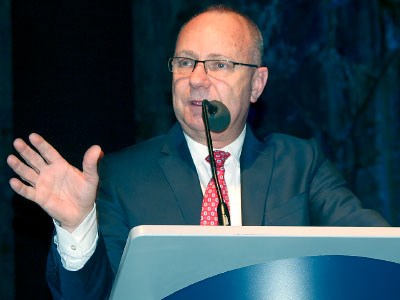Mark Cutifani, CEO of Anglo American and chairman of De Beers, returned “home” to Sudbury to deliver a Goodman School of Mines guest lecture Oct. 27 on Corporate and Political Leadership for Successful Resource Development.
Some of the leadership skills shared by Cutifani were learned in Sudbury during the five years he served as COO of CVRD Inco (now Vale).
A three-month strike shortly after he joined the company in 2003 “was a bitter affair that left both sides bruised and got quite emotional,” he recalled.
Struck by the disconnect between the company and its workers, Cutifani learned that “as the leader of a company, you must always take full accountability when management misses its employees.”
Those who fail to do so “fail the test of leadership,” he said.
Following the strike, Cutifani and his management team set out to repair their relationship with employees by “creating forums for conversations in the workplace where workers are able to have a real say in how we operate.”
At the same time, Cutifani took steps to rebuild the company’s relationship with the community.
“Engaging with the community isn’t necessarily about money,” he said. “It’s about the leadership making a personal commitment to be a true partner with the city…and helping the city achieve its objectives.”
This is especially true in continents like Africa where the community often doesn’t have the resources to make use of financial contributions, noted Cutifani.
Under Cutifani’s leadership, CVRD Inco played a key role in the establishment of the Centre for Excellence in Mining Innovation, the Vale Living with Lakes Centre, and Dynamic Earth, a geoscience centre that’s part of Science North.
“Leaders have to demonstrate that they’re doing good things in society because if you’re not creating sustainable value for society, by definition, your business is not sustainable,” said Cutifani.
“As a result of a lack of trust in our industry, some $90 billion worth of extractive industry projects have been expropriated by governments in the last five years…and more than $25 billion worth of mining projects are held up due to disputes with local communities,” he pointed out.
In most cases, only a small fraction of a community benefits from a mining operation, he said. At best, a mine creates employment for 20 per cent of the population, leaving everyone else impacted by higher prices and the disruption of traditional lifestyles. “We build the community up for a period of time, but only a small percentage of people enjoy the higher salaries, and when we go, there’s nothing left.”
The answer, said Cutifani, is to ask people what kind of community they would like to see in the future and to help them achieve that objective.
Plagued by tanking commodity prices, Anglo American is in the midst of cutting tens of thousands of jobs and spinning off assets, but when the dust settles, Cutifani said he’d be “very happy to extend (the company’s) footprint in Canada” beyond subsidiary De Beers’ Victor, Snap Lake and Gatcho Kue diamond mines.
Even Ontario’s Ring of Fire chromite resources would be of interest to the company, Cutifani said.




